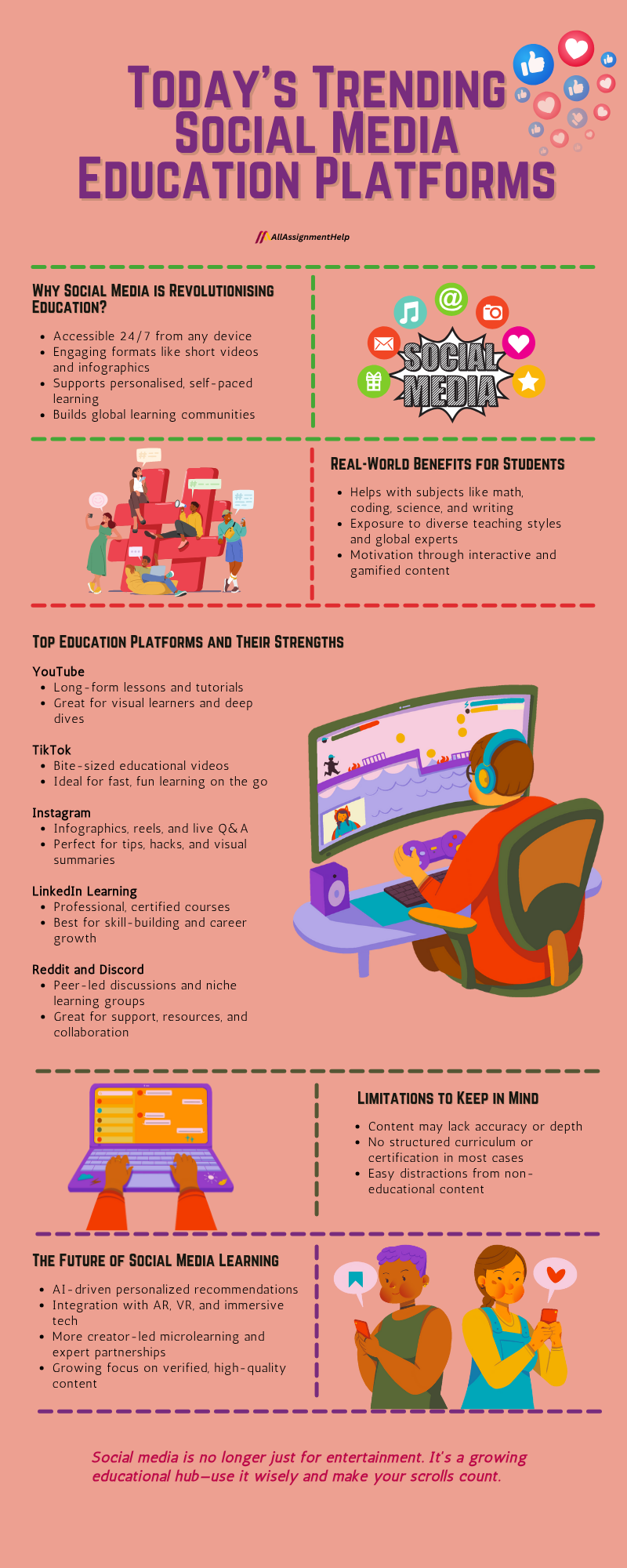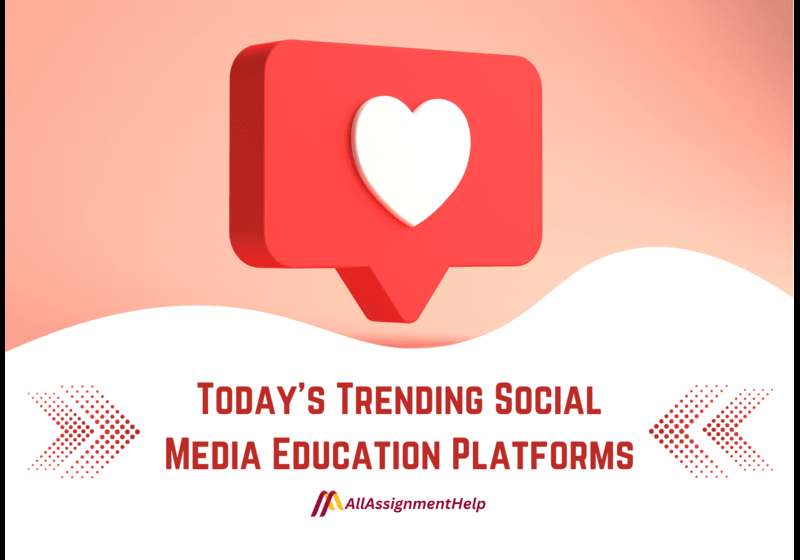Table of Contents
Social media has been behind the massive changes in how we learn in the past few years. Apps such as YouTube, TikTok, Instagram and LinkedIn were previously primarily only used to connect with people and for entertainment, but now feature all-encompassing power in education too. Over time, these platforms evolved into digital classrooms, where learners can access short and inexpensive lessons, skill tutorials, and expert insights at any time of the day, from anywhere. From school children looking for assistance with their homework to workers looking to reskill and upskill, the vast audience now accessing social media for learning purposes. The ease and interaction these social media education platforms offer are transforming our existing learning methodologies and making education more accessible.
In this blog by All Assignment Help, we will discuss the best trending social media education platforms across the globe. Also, how they are changing the game of online learning in a more interactive, community-driven and accessible manner.
The Rise of Social Media in Education
Over time, social media has transformed with the right speed from a source of casual connection to an indispensable part of the educational ecosystem. Creators are creating amazing, engaging content specifically for learners across ages on platforms like YouTube, TikTok and Instagram. A lot of this change has occurred due to increasing demand for flexible and accessible learning tools that we can include in our busy, mobility-driven culture.
Taking the education process online, got social, leading up to social media, to fill the void of learning caused by closures of classrooms during the COVID-19 pandemic. Also, it has now been a major pivot in the history of education, where online modalities have shown their ability to deliver educational content at scale and density that enhances the learner experience. Be it learning a new coding language, solving math problems, or getting online assignment help, social media education platforms give immediate access to a wide range of resources.
What makes these platforms so powerful is that they can convert passive scrolling into active learning. Social media could contribute largely to the advanced era of education.
Also read: Media Dissertation Topics to Explore
Top Trending Social Media Education Platforms
With the growing need for the future, many social media services have started working here as leaders of online education. These platforms not only spice up the learning process but are also adaptive to the traditional way of imparting knowledge, ultimately making it easier and fun for everyone around the globe to access it.
YouTube
It is one of the most effective channels to educate online. Channels such as Crash Course, Khan Academy, and Veritasium offer free, quality educational content across subjects like science, history, and mathematics. No matter if you are preparing for exams or need to acquire a new skill, YouTube has a wide range of content for every type of student.
TikTok
To our surprise, TikTok has become a micro-learning platform. It has easily digestible video content that simplifies complex topics. They use the TikTok style of the platform to deliver fast, visual learning tools for everything from grammar tips to career advice.
Experts use infographics, carousel posts and reel types of content to educate the audience through Instagram. Educators and subject experts create the content around study hacks, exam preparation strategies, and Live Q&A sessions. Instagram often leads students who are searching for guidance or looking for online class help to professionals who have niche expertise in providing academic assistance.
LinkedIn Learning
LinkedIn Learning also comes in here, particularly for those looking to sharpen their professional skills. If you are looking to enhance your career, this is a great platform due to its organised, certified courses. The platform associates itself with your professional profile, which in turn makes the entire learning process credible.
Reddit and Discord
Both Reddit and Discord function as community learning platforms that allow users to join specialised communities based on the subject matter of the disciplines they are studying. These forums are nice environments for peer-to-peer learning, sharing of guides, and free discussions. Even students turn to these platforms for assistance with tasks like, help me take my online exam, a new-age trend where users seek expert help with time-bound academic work.
To sum up, these platforms are more than just tools. They are developing educational ecosystems. Social media education platforms provide different options for both casual learners and those focused on more serious academic pursuits.
Also read: Best Psychology Research Topics| Get Here

How These Platforms Revolutionise Online Learning
Social media education platforms are not just changing the when, they are changing the where! Coupled with their innate ability to make education engaging, accessible and personalised using dynamic, intuitive interfaces complemented by interactive formats, these platforms have taken the education landscape by storm.
Engagement
One of the largest benefits is engagement. While traditional lectures can be boring or overwhelming, content through the likes of TikTok and Instagram uses short-form content to deliver bite-sized pieces of information that are fun and engaging. They can also condense quizzes and real-time poll snippets to keep the users interested while absorbing most of the information.
Accessibility
It is another major shift. The best educators, professionals, or peers are accessible to anyone with a smartphone and an internet connection, usually for free. This makes education accessible for everyone, including those who cannot pay for expensive courses or university degrees.
Sense of community
The feeling of community is another hugely impactful change. Learners have a space to leave comments and questions, and they get instant responses. The interaction aspect of the experience also gets a level. This sort of peer-to-peer connection helps build both motivation and understanding of complex concepts through collaborative effort.
Peer-led learning
In addition, these platforms also encourage student-led learning and small-group support. For instance, let us say a student requires help with an economics assignment, he can easily find educational content and expert guidance or even directly contact a therapist on Reddit, Discord, or Instagram.
Creator-led education
Finally, learning from creators allows you to get real-world experiences and practical tips that are not always found in textbooks. Content creators, for the most part, combine scholarly expertise with personal experience, making learning more relatable and application-based.
So, in a nutshell, social media education platforms have opened the doors of education for the masses. With it, students can learn at their own pace, access topics they want to learn about and interact with many different voices across the globe. Not a trend, but the future of online education.
Challenges and Limitations of Social Media Education Platforms
There are many advantages to using social media education platforms. However, their challenges as well as limitations also exist. The biggest problem is content moderation.
The information is not always correct.
Content on these platforms is often created by people with no formal teaching qualifications, unlike formal education institutions. This can be problematic as it means that users can convince themselves that viral misinformation is a fact, computing comfort at the expense of actual knowledge.
Lack of learning pathways
The bulk of social media education platforms is piecemeal. There is no syllabus to follow, so the learner cannot have a reference for building a foundation or a method to keep track of their advancement. Even this may turn out to be a problem for students who are at their exam time or are working on extensive assignments such as a term paper or thesis writing.
Distraction
Social media exists for entertainment, and educational content always runs alongside memes, trends, and viral video clips. It could easily cause a diversion for the learners and lead to a waste of time and study hours.
Issue of trustworthiness and accreditation
Then comes the issue of trustworthiness and accreditation. However, few social media platforms provide formal certification, making it difficult for learners to officially showcase their skills in an understandable format.
Getting academic support is also difficult for students. There is plenty of content, but there is also a lack of depth and its ability to be customised for a task. For example, someone searching for English homework help may stumble across some common tips for grammar, or some general strategies for writing an essay, rather than the specific feedback and one-on-one support a tutor provides.
To conclude, there are many new avenues that social media education platforms have opened in online learning. However, it always needs to be taken with a pinch of salt. It is at its best when used to augment, not replace, formal, credible learning materials.
The Future of Social Media Education
With continued advances in technology and changes in user behaviour, the future of social media education appears to be very bright. For example, personalised learning experiences driven by artificial intelligence (AI) are just one of the significant developments we might anticipate. Education will become more personalised as platforms harness algorithms to recommend content according to the user´s interests, proficiency, and learning speed.
We can also expect to see tighter cooperation between schools and social media education platforms. Imagine universities and schools offering micro-courses followed by a live Q&A session or even an assessment right on YouTube or LinkedIn Learning. It will be the bridge between the education system and the consumption of digital content.
Active learning is not just about groups; social media learning could further benefit from interactive and immersive technology such as AR and VR, providing virtual labs, history walk-throughs, or real-world simulations.
Finally, the creator economy will continue to expand. Educators and subject-matter experts will network to create personal brands, sell courses, and display learning communities that will encourage learners to connect with their peers and remain active.
In short, it would be favourable for social media to keep democratizing education and make it more accessible and engaging. The balance between innovation, credibility and depth will be the key.
Conclusion
Social media education platforms are changing the landscape of learning by making education more interactive, affordable, and communal. A platform for every skill level, from short tutorials to longer lessons. There are issues such as content appropriateness or unstructured nature, but there are more pros than cons. Social media education platforms are going to be a major part of learning as technology changes. If coupled with quality academic resources, these platforms will help learners achieve the skillset they are after. Gone are the days of classrooms; all science is just a scroll away.
Frequently Asked Questions
Question: What are the best online education social media platforms?
Answer: YouTube, TikTok, Instagram, LinkedIn Learning, Reddit, and Discord
Question: Why do students prefer social media for completing online assignments efficiently?
Answer: Students can find everything from tutorials to expert advice and peer support on social media that can help them to come up with online assignments effectively.
Question: How does social media change how we learn?
Answers: Social media may help bridge the gaps of accessibility and engagement to some degree, but should be a supplement rather than a replacement for formal education.
Question: Is it safe to get online class help through social media?
Answer: It can be useful, but always check whether they are telling you the truth or not and do not rely on these 100% for your academic work.
